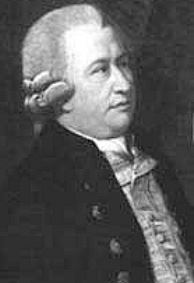John Arnold (1736-1799) was a famous English watch and clockmaker who is considered one of the most innovative and influential horologists of his time. He was born in Bodmin, Cornwall, England, on December 30, 1736, and was the eldest son of a watchmaker also named John Arnold.
Apprenticed to his father, Arnold acquired watchmaking skills and quickly showed great aptitude for the trade. It is also likely that he worked alongside his uncle as a gunsmith. Both of these trades would have given him the skills to work with minute metal components. In his early 20s, Arnold moved to London and established his own workshop in 1762, where he began making watches of his own design. His early work focused on producing high-quality marine chronometers, which were essential for accurate navigation at sea.
Detent escapement
Arnold’s most notable invention was the detent or chronometer escapement. This was a significant development in the field of clockmaking as it greatly improved the accuracy of timekeeping. His detent escapement became widely used and was even adopted by the Royal Navy.
Arnold also invented a number of other important timekeeping mechanisms, including the bimetallic compensation balance, which compensated for temperature changes that affected the accuracy of watches. He also developed the detent escapement and the helical balance spring, which improved the accuracy and reliability of watches.
John Arnold was a pioneer in the development of marine chronometers. He made several chronometers for use on ships at sea. His chronometers were used by James Cook on his second voyage of discovery in the southern Pacific. However, of the three marine chronometers that went with Cook only one was still working at the end of the voyage.
Patents
Arnold had several patents, including one for the bimetallic compensation balance in 1775 (No.1113) and another for his detent escapement in 1782. He worked with some of the leading figures in the field of horology, including the French watchmaker Abraham-Louis Breguet.
Arnold and Breguet had a professional relationship that lasted for many years. They worked together on several projects, including the creation of the first watch to feature a tourbillon escapement, which is a device that compensates for the effects of gravity on the accuracy of watches. This was a significant development in watchmaking and the tourbillon escapement remains highly prized by watch collectors today. Arnold is generally credited with the concept of the tourbillon. However, Breguet was the first to successfully incorporate one into a watch. Arnold died before he was ever able to construct a working tourbillon himself.
In conclusion, John Arnold was an influential watch and clockmaker. Over a long career, he made significant contributions to the field of watch and clockmaking. He invented several important timekeeping mechanisms, including the detent escapement and the bimetallic compensation balance. He worked with some of the leading figures in the industry, including Breguet.
Related content
Balance wheel at Wikipedia.

